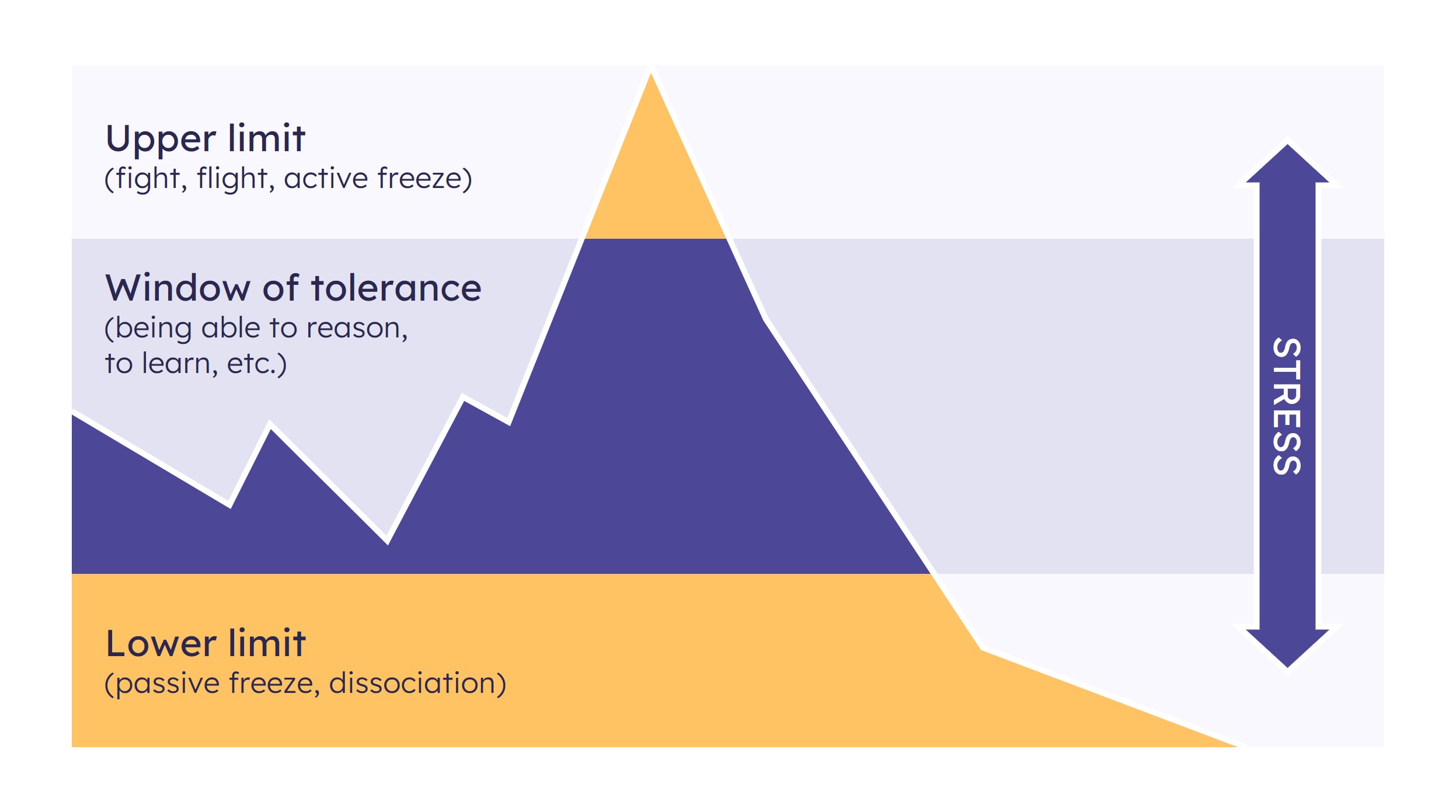Stress
Stress is a natural and automatic response of the body to a challenge or threat from your surroundings.
It is hard to admit you are experiencing stress that leads to avoidance.

Did you know this?
Worldwide - and therefore in Flanders as well - people are increasingly faced with stress. 30 to 40% of all students report stress symptoms. A certain level of stress is inevitable and can even help you to perform better. However, persistent, chronic stress increases the risk of certain physical conditions (such as heart problems and strokes) and psychological problems (including symptoms of depression).
How stress can be helpful
Everyone feels stressed and anxious once in a while. Both stress and anxiety are basic emotions that can be very useful in helping you to react quickly and efficiently to difficult and threatening situations. When you experience a threat, your built-in stress response system is activated, and multiple hormonal reactions bring you into a heightened state of alertness to help you respond appropriately.
This can be useful even when studying. For example, when you have fear of failure, this anxiety can bring about a stress reaction in your body that stimulates you to do your very best and study harder. It makes you more alert and temporarily boosts your carrying capacity.
The stress response system and the boundaries of healthy stress
The stress response system regulates itself. In case of threat, stress and anxiety, hormonal reactions bring about physical symptoms, such as restlessness, shaking, sweating, dizziness, stomach aches or headaches, insomnia, fainting, nausea and so on. After a while, hormone levels decline and the body returns to a resting state.
A healthy dose of stress and anxiety have an upper and a lower limit. As long as you stay within this so-called ‘window of tolerance’, you function at your best. Within this window, you are able to tolerate stress well, discuss with others, focus on your tasks and be creative.
When your stress and anxiety levels increase to the upper limit, your stress response system is activated and you are overwhelmed by intense reactions (fight, flight or freeze). You become overstimulated and react automatically. This can manifest itself in taking impulsive decisions or giving unrestrained criticism, for example. Mostly, these are reactions you hardly have any control over, and hence you don’t consciously choose to respond this way.
In challenging times, you can also reach the bottom level of your window of tolerance. In that case, you sort of freeze and you feel empty. You are paralysed by fear, transfixed, you snap shut or are completely blocked, for example for a presentation or whilst studying for a difficult exam.
It is therefore best to strive for an optimal level of stress. This search is a process of trial and error.
Students who experience too little tension are often bored and long for challenge, in contrast with students who are confronted with (excessively) high stress levels, who may experience feelings of anxiety and exhaustion. Sometimes, they try to find a solution in avoidance behaviour. Persistent stress can lead to fear of failure.
Recognising stress
Stress manifests itself in different ways:
- physically: with symptoms like fatigue, insomnia, muscle pain, headaches, backaches, stomach aches, intestinal disorders, bad appetite, diminished immunity, palpitations, high blood pressure, chest pain and so on.
- in thoughts and emotions: with crying fits, worrying, anxiety, lethargy, forgetfulness, loss of concentration and/or confidence, irritability, blackouts,...
-
in behaviour: decreased performance, making more mistakes, smoking, drinking, neglecting sleep, avoiding social contacts and so on.

Striving towards a healthy balance
There are different strategies to tackle stress.
On the one hand, you can change the situation that causes you distress. On the other hand, you can tackle your reaction to this situation. Strategies to control stress all focus on seeking a healthy balance between your load and your carrying capacity. Load refers to the level of pressure you experience. Carrying capacity means how much you are able to carry and the way you deal with stress.
These tips might be useful in your search for balance:
- Figure out what causes you distress and whether you are able to change these situations; maybe making minor changes will make a big difference already. Outline the specific problem, determine which steps you can take and how you are going to do this.
- If it is not possible to change the situation itself, try to tackle your reaction to it. Accept things as they are and do not aim to change them at all costs.
- Try to relax. Maybe mindfulness, yoga and breathing exercises can be useful.
- Exercise sufficiently. Exercising is an effective way to channel stress.
- Prioritise sleep. This way, overstressed and exhausted systems in your body are given the opportunity to restore themselves.
- Work on a healthy and balanced diet, which supports your body’s resilience.
- Meet up with friends and maintain social contacts.
- Bring variety and rest to your days. Clear your mind by incorporating at least one activity you find fun and relaxing into your schedule.
- Go through the online module on stress and anxiety on MoodSpace.
Getting your stress levels under control
The online self-help programme ‘Stress and anxiety’ consists of six sessions to help you get a grip on your stress and anxiety.
Going through the online modules was a good way for me to gain an insight into the situations that cause me stress and anxiety.
Talk about it
Do you feel these tips are not sufficient to lower your stress levels? Does stress impact your daily functioning (for example your mood, sleep, concentration and relationships)? Then it might be a good idea to seek professional help. A psychologist can help you find an efficient way to tackle your stress. Are you struggling with stress and are you worried about it?

An important first step is to talk about it. Speak to someone you feel comfortable with and trust, preferably someone you know well, like a good friend, your parents or a sibling.
If you struggle to talk to someone in your close surroundings, try to approach a person who is familiar with similar experiences, such as a GP or a student advisor at your college or university.
You can also anonymously contact Awel (102 or via www.awel.be), Tele-Onthaal (106 or via tele-onthaal.be) and the Suicide Line (1813 or zelfmoord1813.be) for questions regarding suicidal thoughts.
Feared and conquered: students and expert share their experiences
Anxiety, stress and depression. Sooner or later, many students will have to deal with these issues to some extent. In this episode, our host addresses this topic together with her guests, Birthe and professor Patrick Luyten (KU Leuven & University College London), who is specialized in mood disorders.
Worried about someone?
Have you noticed a friend dealing with stress, and are you worried about them? Talk about it and share your concerns. Try to be understanding and listen to their story without judging them.
Keen to learn, read or hear more about this topic?
Podcasts
Self-help
TED Talks
Powerful stories
You are not alone. Get inspired by other students' stories about vulnerability and doubt. But above all about the power of connectedness.
Go to the stories